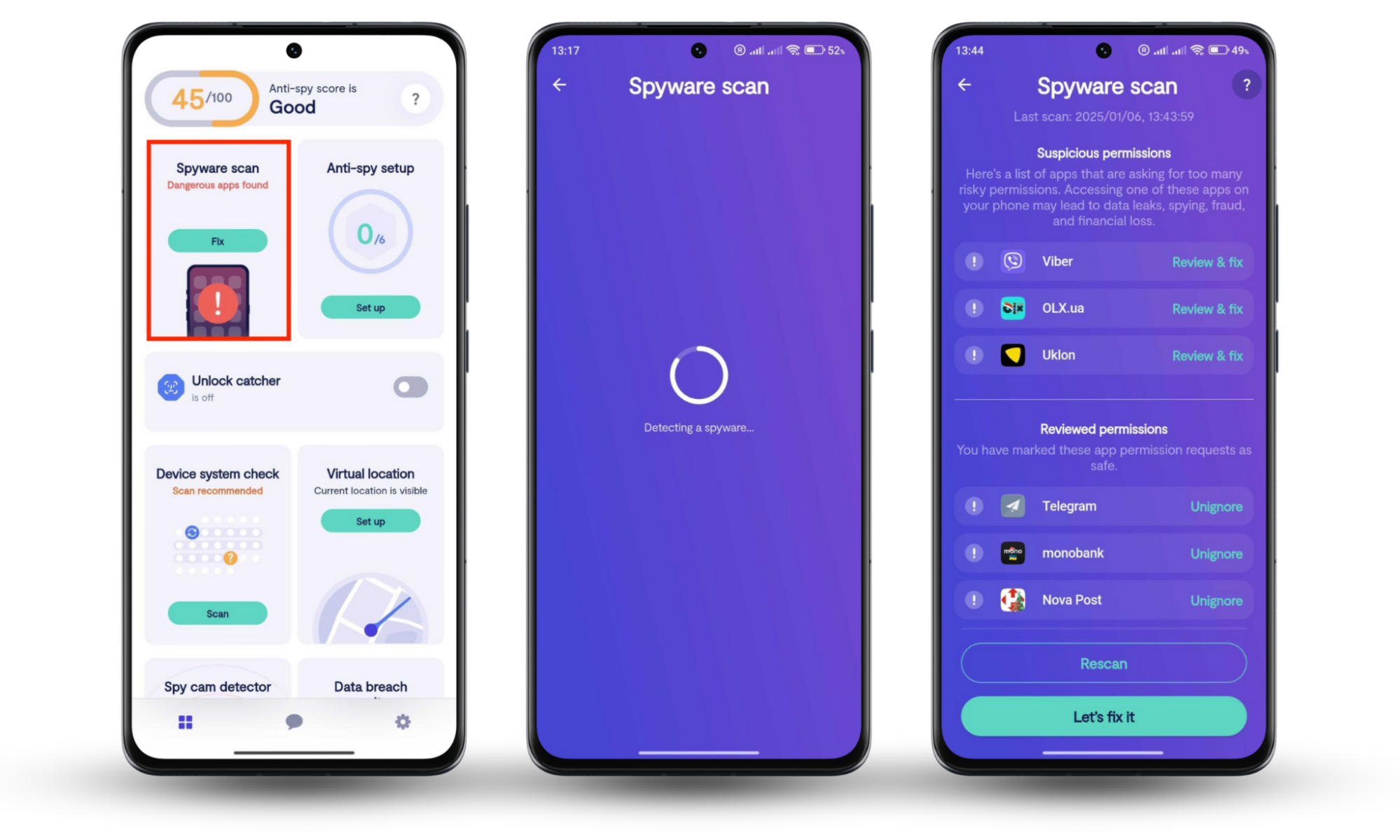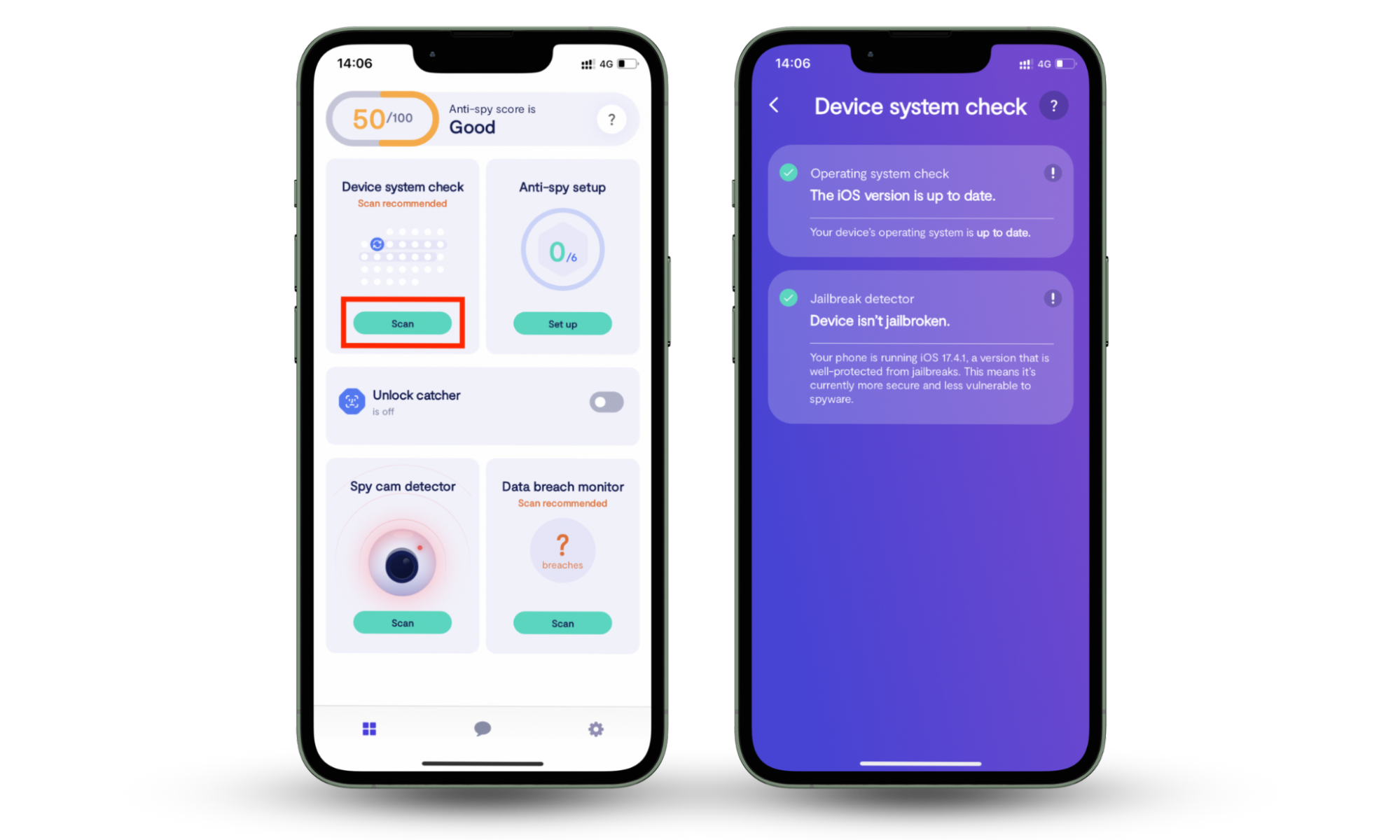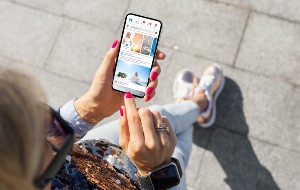Table of contents
- Why your phone is target for hackers
- Top apps to secure your phone from hackers
- Antivirus & spy protection
- Secure communication tools
- Password management solutions
- Anti-theft & device recovery apps
- VPNs for secure browsing
- Two-factor authentication (2FA) apps
- Conclusion
Why your phone is target for hackers
Hackers might target your phone for several reasons, including stealing personal data, such as passwords, messages, or company information. They might also want your bank details or try to spy on you.
How do people hack your phone? They might use:
- Phishing emails or text messages
- Malicious apps
- Unsecured Wi-Fi networks
Worried that someone already has access to your phone? Find out how to check if your phone is hacked.
Top apps to secure your phone from hackers
The best apps to protect your phone from hackers will vary between users. For example, if you want to secure your iPhone from hackers, you might need a different app than if you want to protect your Android. If you only use your phone for the occasional SMS, your cybersecurity requirements will be less than those of someone who regularly does online banking.
We’ll look at apps in the following categories:
- Antivirus and spy protection
- Secure communications
- Password managers
- Anti-theft and device recovery apps
- VPNs
- Two-factor authentication apps
Antivirus & spy protection
If you have an Android, you’re at higher risk of spyware and other malware. Androids can download apps from anywhere, so people can easily distribute dangerous apps.
iPhones aren’t immune to malicious apps, either. Although most iOS users get their apps from the App Store, you can download apps from elsewhere if you’re based in the EU or your iPhone is jailbroken.
Of course, all phones can have security vulnerabilities sometimes.
Antivirus and spy protection apps can check for malware and alert you to apps that might be spying on you. So, if you’re looking for apps to keep your phone safe from hackers, antivirus and spy protection should be first on your list.
1. Clario Anti Spy
Clario Anti Spy is a comprehensive cybersecurity app. It can scan your Android and iPhone for spyware and find apps that might be tracking you.
How to check for spyware with Clario Anti Spy:
- Download Clario Anti Spy and subscribe.
- Tap Spyware scan.
- When the scan is complete, choose to Review & Fix any issues.

iOS is more secure. But if your iPhone is jailbroken or missing security updates, it could be hacked. Clario Anti Spy’s Device system check can alert you to any issues.
How to check for security risks on your iPhone:
- Download Clario Anti Spy and sign up.
- Under Device system check, tap Scan.
- Clario Anti Spy will alert you if there are available updates and if your device is jailbroken.

In addition to the Spyware scanner and Device system check, Clario Anti Spy has a range of other features, including:
- Spyware scan (Android) or Hidden apps scan (iOS) to detect malicious apps
- Spy cam detector to check for unauthorized devices using your Wi-Fi network
- Data breach monitor, which checks for data breaches involving your email address
- Anti-spy setup, which walks you through making your smartphone more secure
- Unlock catcher, which takes a photo of anyone trying to unlock your phone
- Virtual location (Android), which lets you set a different location to fool people trying to track you
These are all included with the subscription.
- Best for: Individuals
- Pros: Scans for spyware (Android) and jailbreaks (iOS), checks for spy cameras and data breaches, protects up to three devices
- Cons: No free version
- Price: $14.99 for one month, $34.99 for three months, or $49.99 for six months. All prices include a 14-day money-back guarantee.
2. Bitdefender mobile security
Bitdefender Mobile Security offers apps for Android and iOS. On Android, it can scan your phone for malware, check for malicious websites, and wipe it if it’s stolen. It also alerts you to potential scams and lets you add an additional lock for particularly sensitive apps. On iOS, it offers less but can still make security recommendations. It includes a VPN and data breach scanner for all phones.
- Best for: Individuals
- Pros: Malware scans (Android), VPN and anti-theft protection
- Cons: Limited VPN, iOS version has fewer features, separate subscriptions for iOS and Android
- Price: $14.99 for the first year, potentially increasing on renewal
3. Avast mobile security
Avast Mobile Security for Android contains a malware scanner. The app’s Privacy Advisor can also explain how to secure your device further, and the Junk Cleaner can remove unnecessary files from your phone. On iOS, it offers tips on how to improve your security and privacy, as well as a scan to find vulnerabilities. It also has a malicious website blocker for all phones.
If you upgrade to Avast Mobile Security Premium, you can also access a lock for sensitive apps or files on Android, and data breach monitoring and VPNs on all phones.
- Best for: Individuals
- Pros: Free version, scans for vulnerabilities, blocks malicious websites
- Cons: Some reviews say it drains battery life, limited free version
- Price: Free, or you can upgrade to Avast Mobile Security Premium for additional features for $69.48 for ten devices for the first year.
4. McAfee mobile security
McAfee Mobile Security has a scam detector, unlimited VPN, Wi-Fi scanner and monitoring for data breaches. It also checks for system updates. For Android, it also offers antivirus scanning.
- Best for: Individuals
- Pros: Scam detector, unlimited VPN, identity monitoring
- Cons: Some reviews say scans are slow
- Price: $30 per year.
Secure communication tools
If you’re worried about someone intercepting your calls or messages, the best apps to protect your phone from hackers will be secure communication apps. They usually offer encrypted messaging and calls to stop people from gaining access to your conversations.
1. Signal
Signal allows users to send and receive text and voice messages, as well as videos, pictures, and other files. It also supports voice and video calls. Conversations are end-to-end encrypted, with data stored on the device only, not the company’s servers.
- Best for: Individuals, groups, organizations
- Pros: Free, widely used, allows users to hide phone numbers
- Cons: Can only message other Signal users
2. Telegram
Telegram allows users to make video and voice calls, send messages, and share files.
For users looking to ensure their conversations aren’t seen, Secret Chats are automatically deleted when you log out. They don’t allow screenshots in Android and alert participants if screenshots are taken in iOS.
- Best for: Individuals, groups
- Pros: Free, widely used, allows live streaming
- Cons: Private chats are not automatically end-to-end encrypted
3. Linphone
Linphone is a free VoIP service—a secure way to make calls and send messages. And, because it’s an open-source app, anyone can look at its code to make sure it isn’t doing anything malicious.
- Best for: Organizations
- Pros: Free, allows voice and video calls, open-source app
- Cons: Only available in English and French
4. WhatsApp
WhatsApp is another way to send end-to-end encrypted messages to individuals or groups. It also allows file sharing, and video and voice calls.
WhatsApp is owned by Meta, who also own Facebook. But because WhatsApp chats are encrypted, only the people involved in them can see the content–so the team at Meta can’t access them.
However, if you use WhatsApp for Business, you can choose to store messages on Meta’s servers or use Meta’s AI to respond to customers. If you’re wary about Meta’s policies, you may want to avoid sending sensitive details to businesses over WhatsApp.
- Best for: Individuals, groups
- Pros: Free, widely used, allows live streaming
- Cons: Can only communicate with other WhatsApp users, business messages may be stored on Meta servers
Password management solutions
Password managers generate and store strong, safe passwords. These aren’t just apps to secure your phone from hackers—they can protect your online accounts wherever you access them.
1. 1Password
1Password generates passwords, helps you sign in automatically, and even works as a two-factor authentication (2FA) app. It works across iOS, Android, and desktop.
- Best for: Individuals, families, organizations
- Pros: Free 14-day trial, offers 2FA, available on multiple platforms
- Cons: No free option
- Price: From $2.99 per month.
2. LastPass
LastPass offers password generation and storage, 2FA support, password sharing, and even dark web monitoring. Paid versions also include encrypted file storage.
However, the company was involved in a security breach.
- Best for: Individuals, families, organizations
- Pros: Free version, offers 2FA, monitors dark web
- Cons: Device syncing is not available in the free version, and the security breach might leave users concerned about its security
- Price: Free, or from $3.00 per month.
Anti-theft & device recovery apps
You might not find out who hacked your phone or stole it, so you may need to wipe it for your own security.
Anti-theft apps can lock or wipe your phone so no one else can access your files. After all, you don’t just need apps to secure your phone from hackers remotely—you need to beware of physical theft, too.
1. Prey Anti Theft
Prey lets you track lost devices and lock, erase, or encrypt your phone, depending on your needs. It even lets you retrieve files on a lost or stolen device.
- Best for: Individuals, families, organizations
- Pros: Free version, lets you retrieve data
- Cons: Must be installed on each device
2. Find My Device (Android) / Find My iPhone (iOS)
If you have an Android, you can use the Find Hub to locate, lock, or wipe your device remotely. Similarly, iOS has the in-built Find My, which lets you find and erase your iPhone or iPad. You don’t need to install any additional software to use them. If you’ve lost your smartphone or it’s stolen, you can access the services through a browser.
- Best for: Individuals
- Pros: Free, already available with iOS and Android devices
- Cons: May not work if your device is off
VPNs for secure browsing
If you use public Wi-Fi or are worried about your internet browsing activity being monitored. VPNs can encrypt your internet traffic, hide your IP address, and even make it look like you’re in a different location.
1. NordVPN
NordVPN offers military-grade encryption and servers around the world, so you can access geo-locked content anywhere you like. It doesn’t keep any logs of your activity, either.
With the Ultimate subscription, you also get 1TB of encrypted cloud storage and a password manager with a data breach scanner included.
- Best for: Individuals
- Pros: Lots of server locations, cloud storage, and password manager with the Ultimate package
- Cons: No free version, renewal rates higher
- Price: From $3.39 per month for a two-year subscription (charged upfront).
2. ExpressVPN
ExpressVPN also has servers around the world, and doesn’t keep logs of your actions. You can use its military-grade encrypted VPNs on up to eight devices simultaneously.
- Best for: Individuals, families
- Pros: Password manager and ad blocker, can be used on multiple devices, free trial
- Cons: High prices
- Price: From $4.99 per month for a two-year subscription (charged upfront).
3. ProtonVPN
ProtonVPN offers a free option, as well as paid versions. All versions include military-grade encryption and servers around the world, and they don’t keep records of your online activity. The premium options support up to ten devices, include ad blockers, and offer ProtonVPN’s highest speeds.
- Best for: Individuals, families
- Pros: Free option, lots of servers, ad blockers in Premium
- Cons: Free version limited
- Price: Free, or from $2.99 per month for a two-year subscription (charged upfront).
Two-factor authentication (2FA) apps
2FA apps generate codes that you need to enter when accessing online accounts. Each code is valid for a short time, and it’s only available on your device—so even if someone knows your password, they can’t log in to your account.
1. Google Authenticator
Google Authenticator saves details to your Google account. You can use the app without a Google account, but your details won’t be backed up—so if you lose access to your device, you’ll lose your 2FA method.
- Best for: Individuals, organizations
- Pros: Free, can remotely erase codes if your device is lost or stolen
- Cons: Doesn’t back up details without a Google account
2. Microsoft Authenticator
Microsoft Authenticator also generates 2FA codes to help you access your online accounts. You can back up your account to the cloud, so you don’t lose your account details if you use multiple devices—but you can’t switch between operating systems this way. For example, you can’t load an iOS backup to an Android device.
- Best for: Individuals, organizations
- Pros: Free
- Cons: Can’t switch between operating systems
3. Authy
Authy is another 2FA app, and is simple to use. You do need to sign up for an account, though, and you need to use your phone number to do so.
The app has also been involved in a data breach, which raises questions about its security.
- Best for: Individuals, organizations
- Pros: Free
- Cons: Need to use phone number for sign up, recent data breach
Conclusion
If you’re looking for the best apps to protect your phone from hackers, you should consider antivirus and anti-spying solutions, secure messengers, VPNs, password management and 2FA software, and an anti-theft app.
Looking for extra cybersecurity features? Clario Anti Spy can scan your Android for spyware, check for hidden spy apps on your iPhone, and look for signs of a jailbreak. Additionally, it includes a Data breach monitor, Spy cam detector, Virtual location feature, and a checklist for improving your privacy and security settings.


